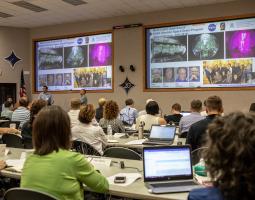Data
The Biological and Physical Sciences Division emphasizes the importance of archiving data, metadata, computational tools, and samples after spaceflight experiments to enable future experiments.
Browse Current and Past Research Projects (NASA Task Book)
To learn more about current and upcoming research projects, search the Task Book: Biological and Physical Sciences Division and Human Research Program. Our online database of research projects includes project descriptions, annual research results, research impacts, and a listing of publications resulting from this NASA-funded research.
Explore opportunities with Open Science and Open Data
Open Science is a model that maximizes community participation in the formulation of investigations and dissemination of data where feasible. Hundreds of investigations can then be conducted from just one flight experiment’s data, exponentially increasing the body of knowledge.
Research conducted under the open science model is also available for scientists to propose future research and enable further discoveries through open data platforms such as:
GeneLab: Open Science for Life in Space
GeneLab is an interactive, open-access resource where scientists can upload, download, store, search, share, transfer, and analyze omics data from spaceflight and corresponding analogue experiments. Users can explore GeneLab datasets in the Data Repository, analyze data using the Analysis Platform, and create collaborative projects using the Collaborative Workspace. GeneLab promises to facilitate and improve information sharing, foster innovation, and increase the pace of scientific discovery from extremely rare and valuable space biology experiments. Discoveries made using GeneLab have begun and will continue to deepen our understanding of biology, advance the field of genomics, and help to discover cures for diseases, create better diagnostic tools, and ultimately allow astronauts to better withstand the rigors of long-duration spaceflight.
GeneLab helps scientists understand how the fundamental building blocks of life itself – DNA, RNA, proteins, and metabolites – change from exposure to microgravity, radiation, and other aspects of the space environment. GeneLab does so by providing fully coordinated epigenomics, genomics, transcriptomics, proteomics, and metabolomics data alongside essential metadata describing each spaceflight and space-relevant experiment. By carefully curating and implementing best practices for data standards, users can combine individual GeneLab datasets to gain new, comprehensive insights about the effects of spaceflight on biology. In this way, GeneLab extends the scientific knowledge gained from each biological experiment conducted in space, allowing scientists from around the world to make novel discoveries and develop new hypotheses from these priceless data.
Physical Science Informatics (PSI)
At NASA, we are excited to offer the Physical Science Informatics (PSI) data repository for physical science experiments performed on the International Space Station (ISS). The PSI system is now accessible and open to the public. This will be a resource for researchers to data mine the PSI system and expand upon the valuable research performed on the ISS using it as a research tool to further science, while also fulfilling the President's Open Data Policy.
Life Sciences Data Archive (LSDA)
The NASA Life Sciences Data Archive (LSDA) is the primary source of life sciences research data and information from decades of spaceflight and ground-analog research involving human, microbe, plant, and animal subjects. Data is collected from NASA-funded investigations through the Human Research Program and the Space Biology Program.
Non-human biorepository of the Institutional Scientific Collection at Ames Research Center (ISC-ARC)
A biorepository collection of non-human spaceflight biological samples exists at NASA’s Ames Research Center. The samples are predominantly from rodent studies but also includes quail tissues and samples of microbes. The Ames Life Sciences Data Archive manages this biorepository, part of the NASA Institutional Scientific Collection at Ames Research Center (ISC-ARC). The largest of its kind, only a handful of such repositories exist anywhere on Earth. Dating back to 1979, the NASA ISC-ARC stores about 32,000 non-human biospecimens. Although mostly obtained from International Space Station and Space Shuttle flight investigations, the collection also includes samples brought back to Earth from Russian COSMOS flights and from spaceflight analog studies. NASA provides an opportunity to generate new scientific knowledge from these previously flown spaceflight experiments by sharing biospecimens with the scientific community through an open-science approach. These biospecimens have been requested, awarded, and analyzed by researchers using a wide range of techniques, including microscopy, histology, and a number of molecular analyses collectively known as “omics.” The biospecimens are searchable through the LSDA Biospecimen Portal.




.jpg?itok=22itlyMH)

